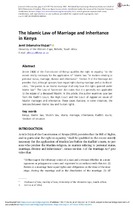| dc.description.abstract | Article 24(4) of the Constitution of Kenya qualifies the right to equality “to the
extent strictly necessary for the application of” Islamic law “in matters relating to
personal status, marriage, divorce and inheritance”. Section 3 of the Marriage Act
provides that, although spouses have equal rights during marriage and at its dissolution, “the parties to an Islamic marriage shall only have the rights granted under
Islamic law”. The Law of Succession Act states that it is generally not applicable
to the estate of a deceased Muslim. In this article, the author examines case law
from the Kadhi’s Court, the High Court and the Court of Appeal on issues of
Muslim marriages and inheritance. These cases illustrate, in some instances, the
tensions between Islamic law and human rights. | en_US |

